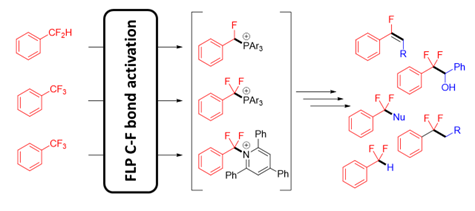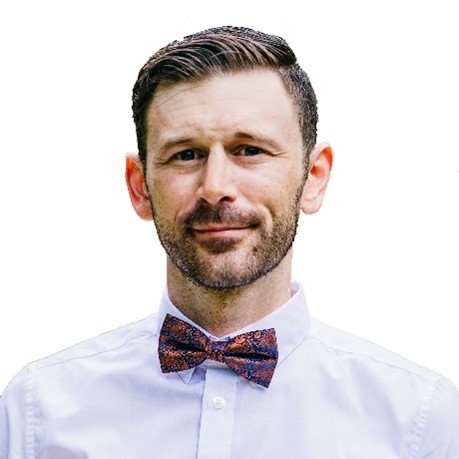Special Seminar: Dr Rowan Young, National University of Singapore
Monday, 1 February 2:00pm – 3:00pm
This seminar will be delivered in Chemistry Lecture Theatre 4 and via Zoom – Please email chemistry.researchsupport@sydney.edu.au for zoom link and password.
Speaker: Dr Rowan Young, National University of Singapore
Host: Dr Indrek Pernik
Title: A Frustrated Lewis Pair Solution to a Frustrating Problem: Mono-Selective Functionalization of C–F Bonds in Di- and Trifluoromethyl Groups
Polyfluoromethyl groups generally suffer from ‘over-reaction’, where multiple C-F bonds are uncontrollably functionalized.1 To solve this problem, we have developed Frustrated Lewis Pair (FLP) mediated C-F bond activation that allows selective monodefluorination via base capture of intermediate fluorocarbocations.2 FLP mediated C-F bond activation can be applied to aromatic, heteroaromatic and non-aromatic difluoro and trifluoromethyl groups to generate selectively fluoride substituted phosphonium and pyridinium salts. These salts can be further functionalized via Wittig coupling, nucleophilic substitution, photoredox alkylation, nucleophilic transfer and hydrogenation reactions (inter alia) to install a range of functional groups into the activated C-F position.

Figure 1. Selective activation and functionalization of difluoromethyl and trifluoromethyl groups mediated by frustrated Lewis pairs (FLPs).
References
- O’Hagan, D. Soc. Rev., 2008, 37, 308.
- (a) Mandal, D.; Gupta, R.; Young, R. D. Am. Chem. Soc., 2018, 140, 10682; (b) Mandal, D.; Gupta, R.; Jaiswal, A. K. ; Young, R. D. J. Am. Chem. Soc., 2020, 142, 2572; (c) Gupta, R.; Jaiswal, A. K. ; Mandal, D; Young, R. D. Org. Lett. 2021, 23, 1915 ; (d) Khanapur, S. ; Lye, K. ; Mandal, D.; Wee, X. J. ; Robins, E. G. ; Young, R. D. Angew. Chem. Int. Ed. 2022, 61, e202210917.
Bio:
 Rowan obtained his BSc.(Hons) from the University of New South Wales in Australia, then went on to pursue his PhD at the Australian National University’s Research School of Chemistry under the supervision of Professor Anthony Hill. After stints at the University of Oxford and the University of Edinburgh as a research fellow in the groups of Andrew Weller and Polly Arnold respectively, he began his independent career at the National University of Singapore in 2014. Since then, he has focused on methodology development using pincer complexes and frustrated Lewis pairs to address challenges in small molecule activation, in particular the selective activation of carbon-halide and carbon-chalcogen bonds. His achievements have been recognized with research awards including Asian Chemistry Prizes from Japan and China (2018), the Thieme Chemistry Journal Award (2019) and the award of an ARC Future Fellowship (2022), which he plans to undertake at the University of Queensland from 2023.
Rowan obtained his BSc.(Hons) from the University of New South Wales in Australia, then went on to pursue his PhD at the Australian National University’s Research School of Chemistry under the supervision of Professor Anthony Hill. After stints at the University of Oxford and the University of Edinburgh as a research fellow in the groups of Andrew Weller and Polly Arnold respectively, he began his independent career at the National University of Singapore in 2014. Since then, he has focused on methodology development using pincer complexes and frustrated Lewis pairs to address challenges in small molecule activation, in particular the selective activation of carbon-halide and carbon-chalcogen bonds. His achievements have been recognized with research awards including Asian Chemistry Prizes from Japan and China (2018), the Thieme Chemistry Journal Award (2019) and the award of an ARC Future Fellowship (2022), which he plans to undertake at the University of Queensland from 2023.

